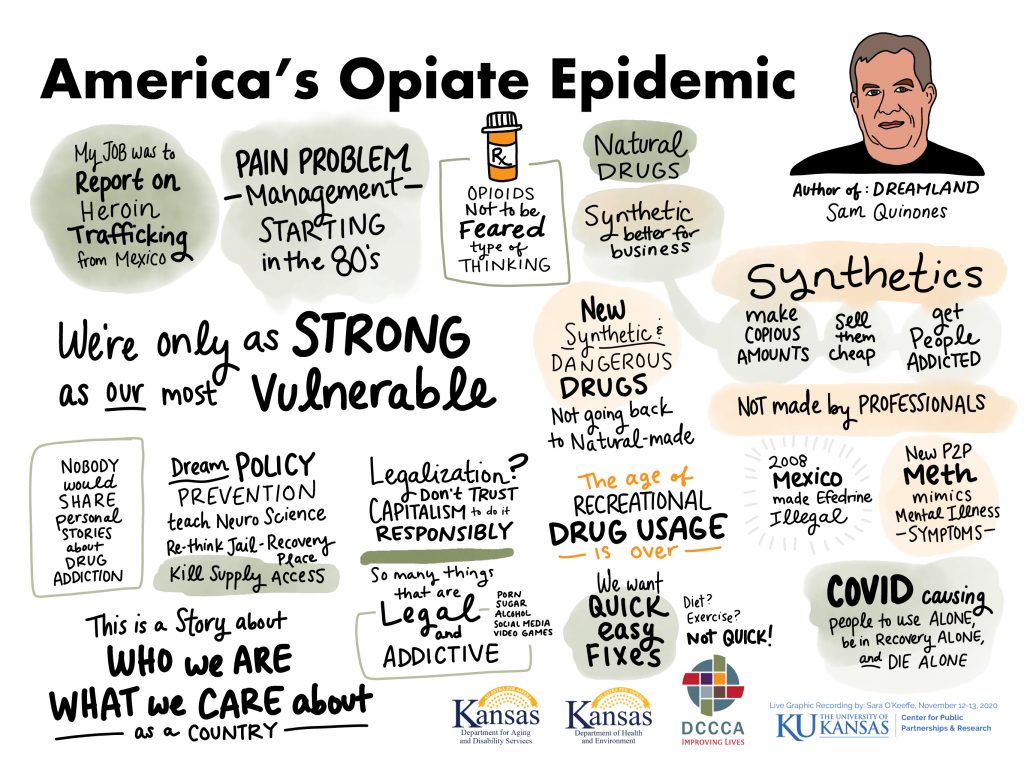November 12
12:00 – 1:00 Welcome and Keynote Speakers
DCCCA Welcome
Lori Alvarado, Chief Executive Officer, DCCCA
KDADS Welcome and Updates
Michele Reese, Opioid Response Program Coordinator, Kansas Department for Aging and Disability Services
KDHE Welcome and Updates
Adrienne Hearrell, Program Manager, Kansas Department of Health and Environment
Keynote Speaker
“I Married A Junkie,” how an addictions professional helped her husband kick heroin and what you can do to help your loved ones combat the throes of addiction.
With 25 years as a clinician and addictions professional, Dr. Cali Estes opened up a private practice and began helping people around the world get sober from drugs and alcohol. During building her signature practice, Sober on Demand, and helping top Celebrities, NFL, and Ceo’s get their lives together, hers was falling apart at home. Her husband, a touring drummer, Tim Estes, started using heroin. After 3 overdoses, a carjacking, and 7 car accidents, he got sober. They wrote a book about it called ‘I Married A Junkie”. Dr. Cali will share her experience from both sides, as the wife of an addict and as a clinician, and offer key takeaways that will help you help your loved ones get clean and sober and live a happy and productive life.
Cali Estes, Ph.D., ICADC, MCAP, MAC, CPT, CYT, Founder, The Addictions Academy
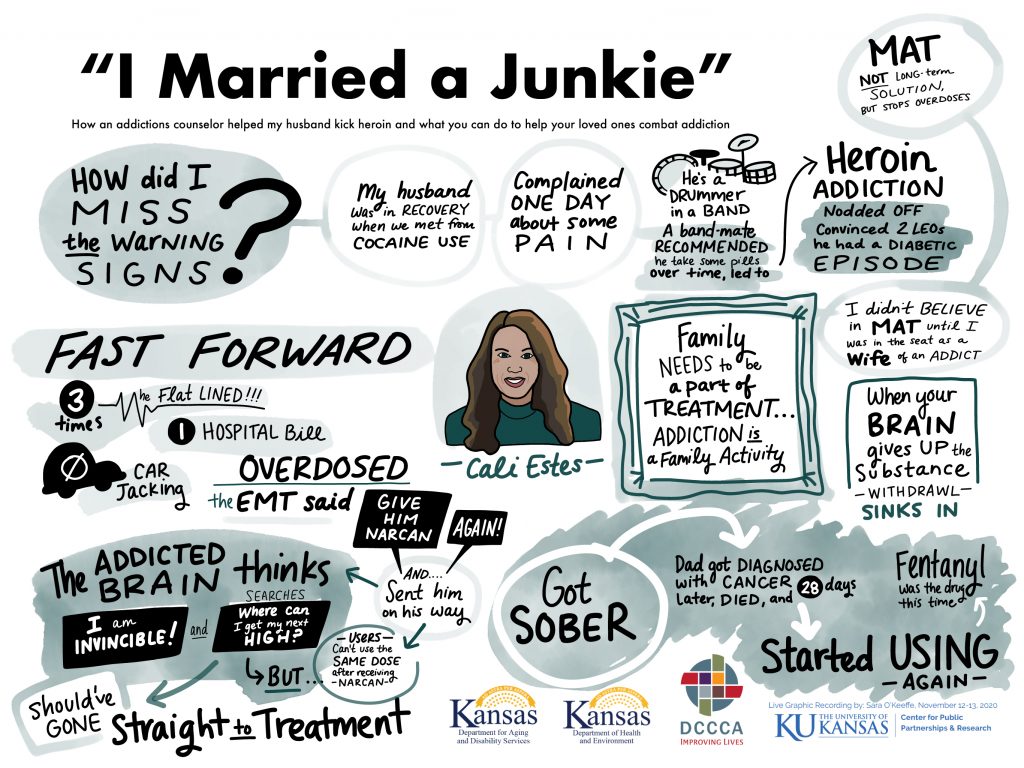
1:00 – 1:15 Break
1:15 – 2:00 Breakout Sessions 1

Inclusion of Sex and Gender Concerns in State Action Plans and Clinical Practice Guidelines
This panel will discuss the broad-reaching impact of opioids and women, how state action plans are developed, and a recent review performed by the presenters of state action plans in the US and recommendations for improvement. In addition, the need for inclusion of sex and gender differences in clinical practice guidelines related to prescribing will be discussed.
Kimberly Templeton, MD, Past-president, AMWA, co-chair AMWA Opioid Addiction in Women Task Force, Department of Orthopaedic Surgery, University of Kansas
Connie Newman, MD, Adjunct Professor of Medicine, Department of Medicine Division of Endocrinology, Diabetes & Metabolism NYU School of Medicine
Taylor Goss, MPH, Student/Researcher, Health Policy & Management Mailman School of Public Health Columbia University

One Choice for Health: A Data-Informed, Youth-Driven Prevention Message
9 in 10 adults with substance use disorders began using before age 18 underscoring the need for prevention. For teens, the decision to use (or not use) alcohol, nicotine, marijuana and opioids are closely linked. This workshop presents key data trends and new information about the growing One Choice Community.
Caroline DuPont, Vice President, Institute for Behavior and Health, Inc.
Corinne Shea, Director of Programs & Communications, Institute for Behavior and Health, Inc.

Rise. Recover. Live
Dana Smith shares a story of hope. From suburban childhood through tumultuous adolescence and incarceration, she shares how lived experience allows her to connect with others and serve the community through her work at The Phoenix – a nonprofit organization that builds a sober active community that fuels resilience and harnesses the transformational power of connection so that together we rise, recover and live.
Dana Smith, Regional Director, The Phoenix.

Overcoming Addiction
This presentation will include a brief history on David, his disability and his personal testimony on what led to his opioid addiction, what transpired during his 10 year addiction and how he overcame addiction using AA/NA, sponsorship and the 12 steps. The ultimate goal is to leave the audience inspired to either get clean and for communities continuing to assist addicts finding a better way of life while thinking “If David can do it, so can I.”
David Powell, Motivational Speaker, David Powell Speaking
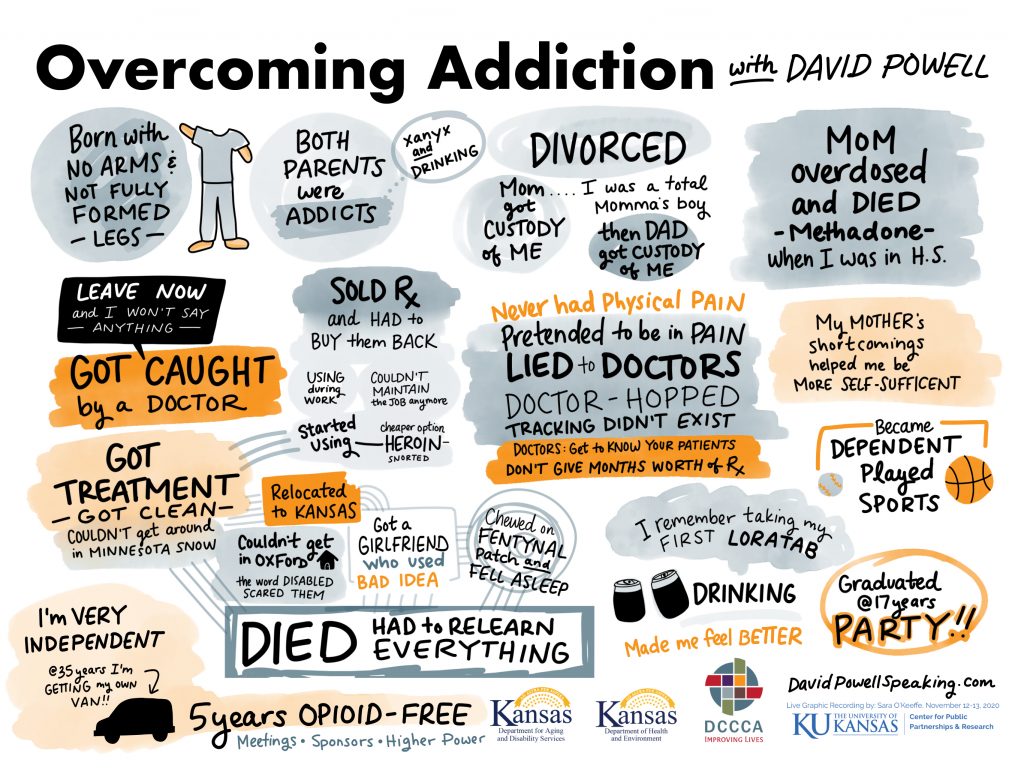

Reducing Recidivism & Sustaining Recovery (1 of 2 breakout sessions – continuation)
In two 45-minute sessions, First Call’s ME After Reentry staff and former participants will inform audiences about the role that pre-and-post release services and supports can serve in reducing recidivism and sustaining recovery. Learn how to build therapeutic alliances at every stage of the incarceration and reentry process.
Keith Faison, Reentry Team Lead, First Call
Kelli Jo Parr, Reentry Program Coordinator, First Call
LaTanya Dumas, Reentry Counselor, First Call
Kris Rochelle, Reentry Recovery Advocate, First Call
2:00 – 2:30 Break
2:30 – 3:15 Breakout Sessions 2

The Role of the Anesthesia Acute Pain Service in Reducing Perioperative Opioid Consumption
This workshop will introduce the concept of an anesthesiologist-led Acute Pain Service and its vitality in maintaining patient comfort and minimizing opioids in the perioperative period.
John-Paul Pozek, M.D., FASA, Assistant Professor, The University of Kansas Health System

Improving Chronic Pain in Legacy Patients by Discontinuing Opiates (And How to Do It)
This workshop provides the methods and results of tapering and discontinuing opiates in chronic pain legacy patients. Real-life examples are presented.
Steve Waring, MD, HaysMed Opioid Stewardship Committee

Unintentional Drug Overdose in Kansas Residents, 2016-2019
Unintentional drug overdoses are an important, preventable cause of morbidity and mortality in Kansas residents, 2016-2019. We explore major categories of and risk factors for unintentional drug overdose, including sociodemographic factors which mediate overdose risk. This focus allows us to intervene where we will be most effective in public health.
Mawuena Quarcoo, PhD, Hospital Discharge and Medicaid Epidemiologist, Kansas Department of Health and Environment (KDHE)

Multimodal Harm Reduction Advocacy and Education for Pharmacy-Based Nonprescription Syringe and Needle Services
In 2019, The American Pharmacists Association House of Delegates passed policies to support harm-reduction programs that provide and promote consistent, unrestricted, and immediate access to evidence-based interventions to enhance the health of people who use drugs, including nonprescription syringe and needle (NPSN) access and safe disposal. This presentation will review policy based on the successful syringe service program (SSP) model, proven to reduce the consequences of risky injection practices.
Jeffery Bratberg, PharmD, FAPhA, University of Rhode Island College of Pharmacy
Traci Green, Phd, MSc, Opioid Policy Research Collaborative, The Heller School for Social Policy and Management at Brandeis University
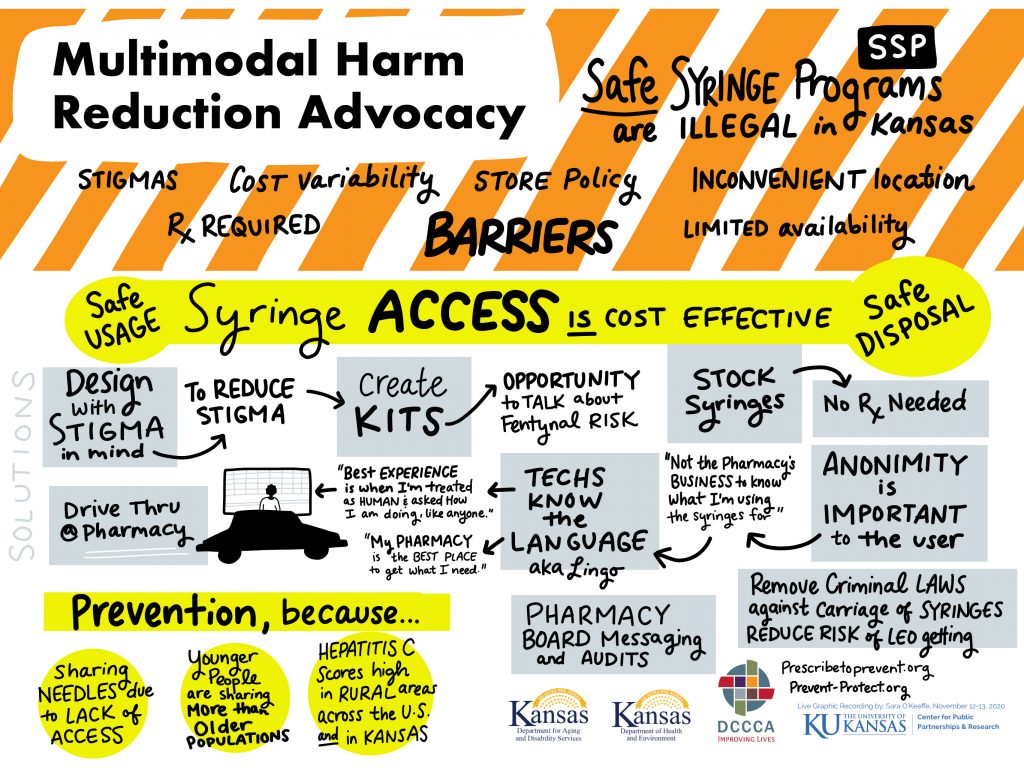

Reducing Recidivism & Sustaining Recovery (2 of 2 breakout sessions – continuation)
In two 45-minute sessions, First Call’s ME After Reentry staff and former participants will inform audiences about the role that pre-and-post release services and supports can serve in reducing recidivism and sustaining recovery. Learn how to build therapeutic alliances at every stage of the incarceration and reentry process.
Keith Faison, Reentry Team Lead, First Call
Kelli Jo Parr, Reentry Program Coordinator, First Call
LaTanya Dumas, Reentry Counselor, First Call
Kris Rochelle, Reentry Recovery Advocate, First Call
3:15 – 3:30 Break
3:30 – 4:15 Breakout Sessions 3

The use of Graded Motor Imagery for the treatment of pain.
This session will present the basics of the central nervous system, neuroplasticity and how graded motor imagery can be used to help people in pain, and thus decrease their dependence on opioid use.
Micah Hilton, Doctor of Physical Therapy, Board Certified Orthopedic Specialist, SERC Physical Therapy

Implementing the Partnerships for Success 2015 Prescription Drug Initiatives at Safe Streets Wichita
This workshop will include information about the history of Safe Streets Coalition, demographics, fun facts about Wichita and the Strategic Prevention Framework. The overall goal of this workshop is to increase community awareness about prevention of prescription drug misuse by highlighting the various strategies that were implemented.
Jan Chandler, Community Mobilizer, Safe Streets Wichita

Employing Telehealth to Treat Opioid Use Disorder
During this session, HRSA and the Telehealth Resource Centers will share best practices on the use of telehealth to treat opioid use disorder and connect participants with opioid related resources and technical assistance.
Nancy Rios, Regional Administrator, HRSA’s Office of Regional Operations-Kansas City
Janine Gracy, Project Director, Heartland Telehealth Resource Center
Richard Overcast, Public Health Analyst, HRSA’s Office of Regional Operations-Kansas City

Engaging Smokers with Substance Use Disorders in Tobacco Treatment
Smokers with substance use disorders (SUD) have high tobacco-related mortality. They worry that smoking cessation will negatively impact their recovery, despite studies showing that smoking abstinence improves drug abstinence. We will discuss barriers to implementing tobacco treatment, discuss strategies to overcome barriers, and review updated guidelines on smoking cessation pharmacotherapy.
Hasmeena Kathuria, Associate Professor of Medicine, Boston University School of Medicine
Rick Cagan, Kansas Tobacco Guideline for Behavioral Health Care, National Alliance on Mental Illness (NAMI) Kansas

Charge or Change: How Law Enforcement’s Prevention Efforts and Incarceration Alternatives Have Transformed the Opioid Epidemic
Law enforcement has great discretion to file criminal charges or divert an individual to treatment for drug-related offenses. These decisions are life-altering for individuals and their loved ones. This session will take an inside look at what police and prosecutors consider when choosing between a pair of handcuffs and a treatment program, or between a criminal court and a treatment court. Presenters will offer recommendations for stakeholders looking to implement similar programs and make a significant impact on opioid-related overdose deaths in their communities.
Dave Aronberg, JD, State Attorney, Florida Office of the State Attorney, 15th Judicial Circuit
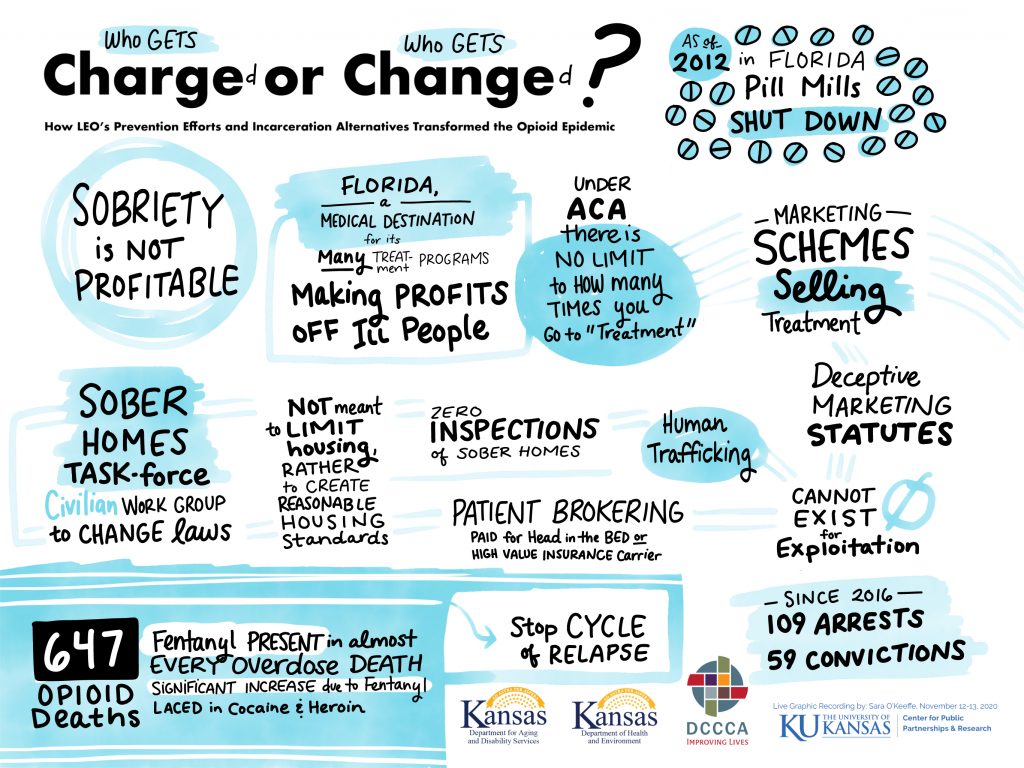
November 13
8:30 – 9:00 Keynote – Alex Elswick
It is Time to Tell New Stories of Addiction and Recovery
We love to tell a single-story narrative of addiction and recovery. The single-story narrative essentially suggests that people get addicted, get tired of addiction, seek help, get treated, and then recover. Twelve-steppers may recognize this as “what it was like, what happened, and what it is like now.” This is the general framework most clinicians and researchers use when thinking about anyone with a substance use disorder (SUD). If you ask someone in recovery to share their testimony, they will likely relate to you a story that follows this narrative as well. The medical community, the academic community, the treatment community, and even people in recovery themselves tell the same single-story. The narrative says that almost everyone recovers through a program of abstinence, that people with SUDs cannot safely use substances because of cross addiction/substitution, and most importantly, we must stop enabling people so they can hit rock bottom. But is that true?
Alex Elswick, Co-Founder, Voices of Hope – Lexington
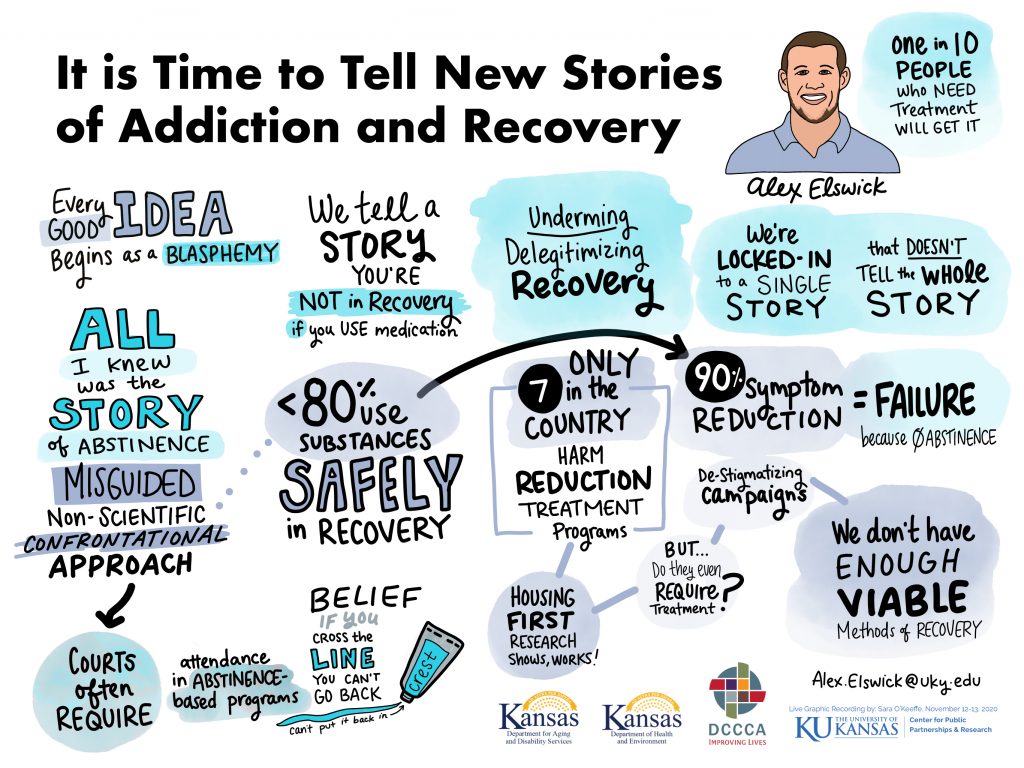
9:00 – 9:15 Break
9:15 – 10:00 Breakout Sessions 4

Assessing the Impact of K-TRACS through Data Analysis and Investigative Review
Opioid prescribing and overdose deaths attributed to prescription opioids are on the decline in Kansas, while K-TRACS usage is at an all-time high. Learn about the impact of the state’s prescription drug monitoring program through data analysis and investigative review findings, including changes observed during the COVID-19 pandemic.
Gayle Donaldson, Public Information Officer, K-TRACS
Jennifer Donnelly, Assistant Director of K-TRACS/Senior Epidemiologist, K-TRACS

Building, Empowering and Sustaining Community Coalitions
Coalitions are diverse, action-driven, self-sustaining groups, is yours? Sharing their coalition’s story about losing their leadership, potential funding and how they have rebounded. Bringing three unique points of view this panel is designed to help you build relationships with local volunteers and community members to better engage as a coalition.
Jay Sharp, Lead Program Coordinator, Rural Health Projects, Inc
Gail Box, President, Austin Box 12 Foundation
Jasie Randol, Licensed Master’s Social Worker, Making A Difference, Inc.

Comparison of Utilization Rates and Types of Opioid Technical Assistance Requests Between the Midwest and the Other Regions
This workshop provides an overview of the Opioid Response Network and its data collection process, as well as a comparison of certain characteristics of technical assistance requests between the Midwest and the other regions.
Yifei Liu, Associate Professor, University of Missouri – Kansas City School of Pharmacy
Holly Hagle, Assistant Research Professor, University of Missouri-Kansas City School of Nursing and Health Studies
Michael Knabel, Sr. Project Manager for ORN Operations, University of Missouri-Kansas City School of Nursing and Health Studies

Wave After Wave: Opioid Use Disorder Treatment in the Age of Fentanyl and COVID-19
Fentanyl and COVID-19 threaten to cause a rising tide of overdoses in Kansas, as they have across the country. Our workshop will help you understand these dual waves, and how they will affect treatment, so that we Kansans, though far from the sea, may learn to breathe underwater.
Daniel Warren, MD, Assistant Professor, University of Kansas School of Medicine-Wichita
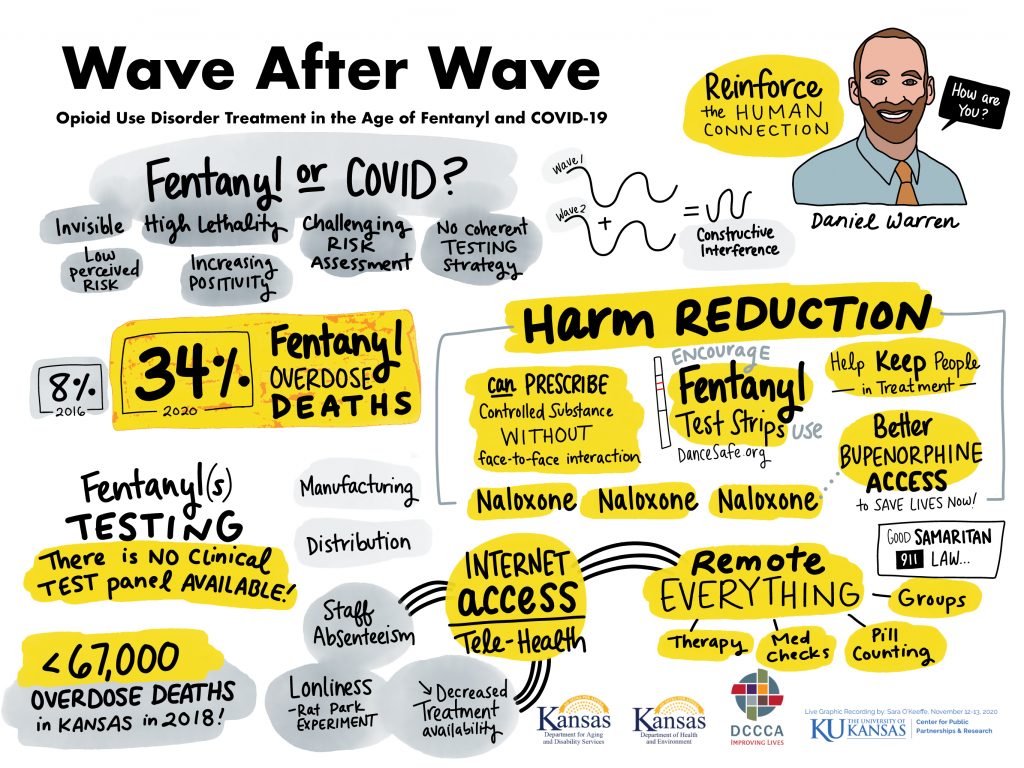

The Benefits and Implementation Challenges of the First State-wide Comprehensive Medication for Addictions Program in a Unified Jail and Prison Setting
This presentation reviews a current study which details the first year of implementation of a state-wide medications for addiction treatment (MAT) program in a unified jail and prison setting at the Rhode Island Department of Corrections in Cranston, Rhode Island.
Lauren Brinkley-Rubinstein, PhD, Assistant Professor, Social Medicine, UNC School of Medicine
10:00 – 10:30 Break
10:30 – 11:15 Breakout Sessions 5

As Easy as 1-2-3…Right? Unique Toxicities of Opioids and Their Management
This presentation will cover the unique toxicities and challenges with tramadol, meperidine, methadone, buprenorphine, loperamide, propoxyphene, and fentanyl. These opioids can present with challenges beyond the typical clinical picture of CNS depression, respiratory depression, and pin-point pupils.
Elizabeth Silver, Managing Director of Kansas Poison Control Center, University of Kansas Health System
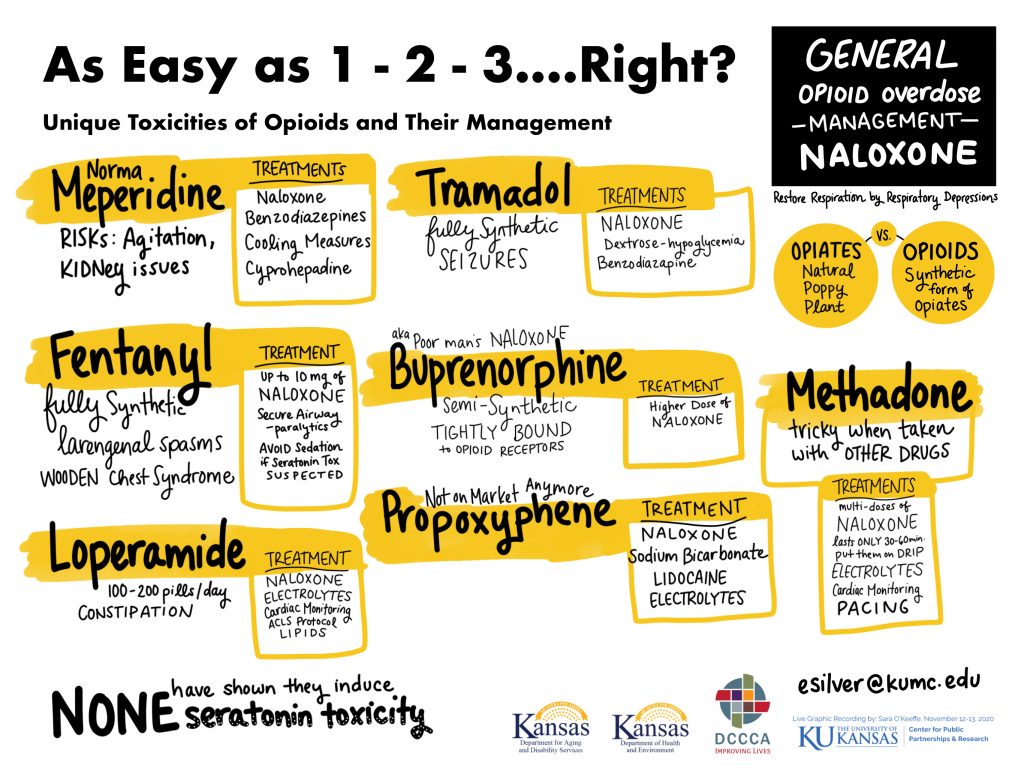

Building Strong Foundations, Resilient Relationships, and a Culture of Acceptance
Presenters will break down the events in Reno County and how they have built a strong collaborative of various stakeholders from a variety of different organizations united in the communities common goal of not only fighting the issues of substance use disorder but increasing the knowledge about it to the community and building a culture of compassion and understanding.
Laurie Carr, Health Promotion Supervisor, Reno County Health Department
Seth Dewey, Health Educator / Substance Misuse, Reno County Health Department

Core DEC Awareness
Through the National Alliance for Drug Endangered Children (National DEC), the drug endangered children mission focuses on the formation of multi-disciplinary partnerships that take advantage of existing agency personnel, resources, and responsibilities and coordinates their mutual interests and duties to meet the specific needs of these children. The focus on these children’s needs extends throughout the entire process until the child is in a permanent, safe and positive functioning environment.
Eric Nation, Director of Training and Development, National Alliance for Drug Endangered Children
Stacee Read, Director of DEC Network Development, National Alliance for Drug Endangered Children

Medication-Assisted Treatment – Treatment for Opioid Addiction
Medication-Assisted Treatment – Treatment for Opioid Addiction. What is it? Why do we do it? Why the behavioral health component is so important, and lessons learned after more than a year in MAT.
Samuel Goetschius, APRN, Genesis Family Health

Patient Characteristics in an Outpatient OUD/Buprenorphine Practice
The workshop will review outcomes of an outpatient program utilizing buprenorphine as a MAT. Compliance with prescribed dosing, relapse rates and quality of life measures will be considered.
Donald Fletcher, MD, Mirror
Cody Beaton, LSCSW, LCAC, SCKS Regional Director, Mirror
11:15 – 11:30: Break
11:30 – 12:30 Keynote – Sam Quinones
America’s Opiate Epidemic: Where We Are and How We Got Here — a conversation with journalist Sam Quinones, author of Dreamland; The True Tale of America’s Opiate Epidemic.
Sam Quinones discusses the roots of our national epidemic of opiate addiction, as well as how that addiction epidemic has changed in recent years, the rise of fentanyl and methamphetamine, and its prospects during a time of pandemic.
Sam Quinones, Journalist & Author
